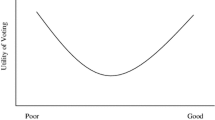Abstract
Previous research suggests that positive and normative beliefs about economics are largely unrelated. Using questions from two national surveys, this study finds that: (a) the underlying determinants of positive and normative beliefs are strikingly similar; (b) education is by far the strongest overall determinant of both positive and normative beliefs; and (c) the variables known to push positive beliefs in the same direction as formal economic training—education, male gender, income growth, and job security—also push normative beliefs in the same direction. These results strongly suggest that the positive-normative connection has been underestimated.
Similar content being viewed by others
References
Alston, R., Kearl, J., & Vaughan, M. (1992). Is there a consensus among economists in the 1990’s? American Economic Review, 82(2), 203–209.
Blendon, R., Benson, J., Brodie, M., Morin, R., Altman, D., Gitterman, D., Brossard, M., & James, M. (1997). Bridging the gap between the public’s and economists’ views of the economy. Journal of Economic Perspectives, 11(3), 105–188.
Blinder, A., & Krueger, A. (2004). What does the public know about economic policy, and how does It know it? Brookings Papers on Economic Activity, 1, 327–387.
Caplan, B. (2001). What makes people think like economists? Evidence on economic cognition from the Survey of Americans and Economists on the Economy. Journal of Law and Economics, 44(2), 395–426.
Caplan, B. (2002a). Systematically biased beliefs about economics: robust evidence of judgemental anomalies from the Survey of Americans and Economists on the Economy. Economic Journal, 112(479), 433–458.
Caplan, B. (2002b). Sociotropes, systematic bias, and political failure: reflections on the Survey of Americans and Economists on the Economy. Social Science Quarterly, 83(2), 416–435.
Caplan, B. (2006). How do voters form positive economic beliefs? Evidence from the Survey of Americans and Economists on the Economy. Public Choice, 128(3/4), 367–381.
Caplan, B. (2007). The myth of the rational voter: why democracies choose bad policies. Princeton: Princeton University Press.
Caplan, B., & Miller, S. (2010). Economic beliefs, intelligence, and ability bias: evidence from the General Social Survey. Unpub ms. http://www.gmu.edu/departments/economics/bcaplan/iqbeliefej.doc.
Citrin, J., & Green, D. (1990). The self-interest motive in American public opinion. Research in Micropolitics, 3, 1–28.
Cooper, J. (2007). Cognitive dissonance: 50 years of a classic theory. Sage Publications: London.
Cowen, T. (2005). Self-deception as the root of political failure. Public Choice, 124(3–4), 437–451.
Friedman, M. (1953). The methodology of positive economics. In M. Friedman (Ed.), Essays in positive economics (pp. 3–43). Chicago: University of Chicago Press.
Foss, D. (1982). A discourse on semantic priming. Cognitive Psychology, 14, 590–607.
Fuller, D., & Geide-Stevenson, D. (2003). Consensus among economists: revisited. Journal of Economic Education, 34(4), 369–387.
Fuchs, V. (1996). Economics, values, and health care reform. American Economic Review, 86(1), 1–24.
Fuchs, V., Krueger, A., & Poterba, J. (1998). Economists’ views about parameters, values, and policies: survey results in labor and public economics. Journal of Economic Literature, 36(3), 1387–1425.
General Social Survey (2008). http://www.norc.org/GSS+Website/.
Glaeser, E., & Sunstein, C. (2009). Extremism and social learning. Journal of Legal Analysis, 1, 263–324.
Goodman, N. (1960). The way the world is. Review of Metaphysics, 14(1), 48–56.
Hainmueller, J., & Hiscox, M. (2007). Educated preferences: explaining attitudes toward immigration in Europe. International Organization, 61, 399–442.
Harsanyi, J. (1969). Rational-choice models of political behavior vs. functionalist and conformist theories. World Politics, 21(4), 513–538.
Howson, C., & Urbach, P. (1989). Scientific reasoning: the Bayesian approach. LaSalle: Open Court.
Krosnick, J., & Alwin, D. (1987). An evaluation of a cognitive theory of response-order effects in survey measurement. Public Opinion Quarterly, 51, 201–219.
Maddala, G. S. (1977). Econometrics. New York: McGraw-Hill.
Mansbridge, J. (Ed.) (1990). Beyond self-interest. Chicago: University of Chicago Press.
Miller, S. (2009). Economic bias and ideology: evidence from the General Social Survey. Journal of Private Enterprise, 25(1), 31–49.
Rawls, J. (1971). A theory of justice. Cambridge: Harvard University Press.
Ricketts, M., & Shoesmith, E. (1992). British economic opinion: positive science or normative judgment? American Economic Review, 82(2), 210–215.
Sears, D., & Funk, C. (1990). Self-interest in Americans’ political opinions. In J. Mansbridge (Ed.), Beyond self-interest (pp. 147–170). Chicago: University of Chicago Press.
Sears, D., Lau, R., Tyler, T., & Allen, H. (1980). Self-interest vs. symbolic politics in policy attitudes and Presidential voting. American Political Science Review, 74(3), 670–684.
Taber, C., & Lodge, M. (2006). Motivated skepticism in the evaluation of political beliefs. American Journal of Political Science, 50(3), 755–769.
Tetlock, P. (2003). Thinking the unthinkable: sacred values and taboo cognitions. Trends in Cognitive Science, 7(7), 320–324.
Washington Post, Kaiser Family Foundation, Harvard University Survey Project (1996). Survey of Americans and Economists on the Economy. October 16, #1199. http://www.kff.org/kaiserpolls/1199-econgen.cfm.
Whaples, R. (2006). Do economists agree on anything? Yes! The Economists’ Voice, 3(9). http://www.bepress.com/ev/vol3/iss9/art1.
Author information
Authors and Affiliations
Corresponding author
Rights and permissions
About this article
Cite this article
Caplan, B., Miller, S.C. Positive versus normative economics: what’s the connection? Evidence from the Survey of Americans and Economists on the Economy and the General Social Survey . Public Choice 150, 241–261 (2012). https://doi.org/10.1007/s11127-010-9700-z
Received:
Accepted:
Published:
Issue Date:
DOI: https://doi.org/10.1007/s11127-010-9700-z




